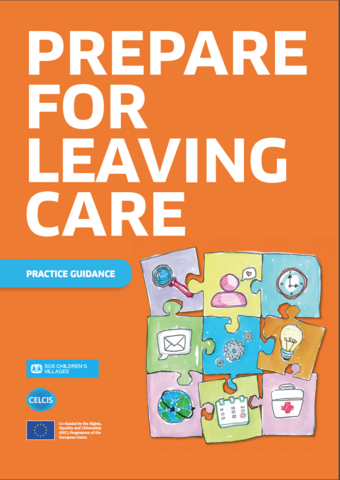This Practice Guidance seeks to promote improvements in practice that should have a positive impact for young people during and after the leaving care process. It is grounded first and foremost in the realities of the national and local contexts in which leaving care is currently carried out. It was produced as part of the Prepare for Leaving Care project.
The approach therefore assumes that there will be no signifi cant change, initially at least, in legislation, policy, regulation and the human and material resources actually available. This is because it will invariably take a considerable time – however necessary and urgent changes may seem to be – to secure positive readjustments in any or all of these areas.
Thus, the first aim of the practice guidance is to stimulate reflection on what the various professionals concerned, carers and other stakeholders can do to improve outcomes for young people within the legal and regulatory framework pertaining in their country. This involves looking at what positive initiatives, both individual and cooperative, could be taken or set in motion within the current context.
At the same time, the Practice Guidance sets out to provide material that can inform initiatives to bring about desirable changes in that contextual framework. It therefore places considerable emphasis on the need for consultation and cooperation among the various actors concerned – as well as, of course, with young people in care or with care experience. The effective advocacy this should generate will be a vital factor for securing the more fundamental changes needed to bring about systemic and signifi cant improvements in outcomes for young people leaving care.
This Practice Guidance has been developed mainly to inform and equip those who hold responsibility for supporting and guiding young people moving from care to adulthood and independence. First and foremost, this means those working directly with the care leavers on a day-to-day basis, notably carers and designated key workers. However, it also includes all those in such professions as health, education, housing, employment services, law and the judiciary. This Practice Guidance is also relevant for decisionmakers and policy-makers in these different fi elds, as well as for advocates for reform.
The contents of this Practice Guidance are in good part informed by a detailed Scoping exercise that was carried out in each of the five countries participating in this project: Croatia, Italy, Latvia, Lithuania and Spain. This exercise included 68 peer-to-peer interviews conducted by and with young care leavers, in consultation with members of the National Young Expert Groups.
Read also: Prepare for Leaving Care Training Manual & Prepare for Leaving Care: Final Publication

